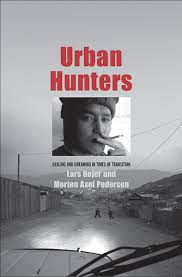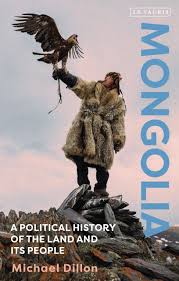|
Interesting Links -- A variety of articles related to Mongolia were posted during February 2020; here are some of the more notable ones:
- Reuters, posted on Feb 1: "Mongolia closes border to China until March 2 to stop virus"
- AKIPress, posted on Feb 3: "Mongolia evacuates its 31 citizens from Wuhan"
- Idaho Mountain Express, posted on Feb 2: "Talk on Mongolian forest at Hailey Library"
- The Oklahoman, posted on Feb 3: "Ancient Egypt, Mongolia on exhibit at Kansas City museum"
- AKIPress, posted on Feb 3: "Mongolia debuts its first ever produced automobile"
- The Diplomat, posted on Feb 9: "Mongolia Braces for Coronavirus Impact"
- Brighton&HoveNews, posted on Feb 9: "The Hu bring their warrior rock to Brighton"
- AKIPress, posted on Feb 10: "Mongolia-South Korea relations expected to move forward to strategic partnership"
- Argus Media, posted on Feb 11: "Mongolia halts all coal exports amid coronavirus spread"
- Foreign Policy, posted on Feb 14: "Living While Female in Mongolia"
- Nikkei Asian Review, posted on Feb 14: "Mongolians embrace 21st century tourism boom"
- AKIPress, posted on Feb 18: "Mongolia cancels all tourism events in March"
- New York Times, posted on Feb 19: "Mongolia to Shut Schools Until March 30 to Curb Virus Outbreak"
- AKIPress, posted on Feb 19: "U.S. pledges to help preventing coronavirus outbreak in Mongolia"
- NASDAQ, posted on Feb 20: "Rio Tinto Subsidiary Seeks Arbitration To Settle Tax Dispute With Mongolia"
- Daily Beast, posted on Feb 22: "‘Black Milk’ Is a Feminist Saga About a Woman Who Repels Bad Men With Black Breast Milk"
*********************************************
Transnational Law and State Transformation: The Case of Extractive Development in Mongolia, by Jennifer Lander; 284 pages; $49.95 as ebook (Routledge, 2019)

This book contributes new theoretical insight and in-depth empirical analysis about the relationship between transnational legality, state change and the globalisation of markets.
Mongolia’s recent transformation as a mineral-exporting country provides a rare opportunity to witness economic and legal globalisation in process. Based on careful empirical analysis of national law and policy-making, the book traces the way distinctive processes of transnational legal ordering have reorganised and reframed the governance of Mongolia’s mining sector, specifically by redistributing state power in relation to the market, sub-national administrations and civil society.
Jennifer Lander is a Lecturer in Law at De Montfort University, UK.
*********************************************
Long Song Heritage of Inner Mongols (Өвөр Монголчуудын уртын дууны өв) by Dorjdagva Myagmarjav (Erdenezul, 2019)

Based on a survey done in 2009 across 5 banners of Inner Mongolia (Ordos, Alasha, Chahar, Horchin-Zarud, Buryat, Barga), the book categorizes long song styles of over 271 songs by 139 singers. The book comes with a DVD of the said singers.
ISBN: 978-99978-4-888-8
To purchase or order this book, please write to: info@nomadic.mn
*********************************************
Multispecies Households in the Saian Mountains: Ecology at the Russia-Mongolian Border, edited by Alex Oehler and Anna Varfolomeeva (Lexington Books, 2019)

Multispecies Households in the Saian Mountains brings together new ethnographic insights from the mountains of Southern Siberia and Mongolia. Contributors to this edited collection examine Indigenous ideas of what it means to make a home alongside animals and spirits in changing alpine and subalpine environments. Set in the Eastern Saian Mountain Region of South Central Siberia and northern Mongolia, this book covers an area famous for its claim as the birthplace of Eurasian reindeer domestication. Using ethnographic nuance, the contributors highlight the many connections between humans and other species, stressing the networks of relationships that transcend idioms of dominance or mutualism. This book is recommended for students and scholars of anthropology, environmental studies, and Asian studies.
"Multispecies Households in the Saian Mountains: Ecology at the Russia-Mongolia Border highlights the complex attunements between humans, animals, and invisible entities in the taiga, using a historical and anthropological perspective. Through rich and original ethnographical vignettes, this volume offers subtle insights into the taiga landscape, perceived as a home shared by human and non-human sentient beings, and adds to our understanding of the shaping of multispecies coexistence in a time of change and uncertainty in Inner Asia" • Charlotte Marchina, Institut National des Langues et Civilisations Orientales
Alex Oehler is assistant professor of anthropology at the University of Northern British Columbia.
Anna Varfolomeeva is assistant professor at School of Advanced Studies at Tyumen State University.
*********************************************
The Anti-Social Contract: Injurious Talk and Dangerous Exchanges in Northern Mongolia by Lars Hojer: (Berghahn, 2019)

Set in a remote district of villagers and nomadic pastoralists in the northernmost part of Mongolia, this book introduces a local world where social relationships are cast in witchcraft-like idioms of mistrust and suspicion.
While the apparent social breakdown that followed the collapse of state socialism in Mongolia often implied a chaotic lack of social cohesion, this ethnography reveals an everyday universe where uncertain relations are as much internally cultivated in indigenous Mongolian perceptions of social relatedness, as they are externally confronted in post-socialist surroundings of unemployment and diminished social security.
“This book is a very important and vibrant ethnographic work… By emphasizing the dynamics of distancing, suspicion and avoidance in anti-social relations, the author introduces a new, and much fuller, conceptual purchase onto the anthropological term ‘other’, which has underpinned a great deal of classical and contemporary analysis in the discipline.” • Katherine Swancutt, King’s College London
Lars Højer is an associate professor at the Centre for Comparative Culture Studies, Department of Cross-Cultural and Regional Studies at the University of Copenhagen. He has carried out extensive fieldwork in Mongolia and Inner Asia. His previous anthropological research has mainly focused on social, economic, religious, and political aspects of transition processes in urban and rural post-socialist Mongolia.
*********************************************
The Mongols and the Armenians (1220-1335) by Bayarsaikhan Dashdondog: 270 pages; Open Access (Brill, 2011)

This book is an invitation to a journey to the medieval world, which, in author’s opinion, is the most picturesque period of human history to embark back to, and it is definitely one of the fascinating moments of the Great Mongol Empire. It is an interesting journey in many way: historically, geographically and culturally. It will take the reader from the Inner Asian plateau to the Caucasus, Anatolia, Middle and Near East; from a nomadic culture to sedentary civilizations; from a warrior’s mindset to the subjects’ survival policy.
The present work tries to understand the connection between the various aspects of East and West in Medieval times by exploring relations between two nations, the Armenians and the Mongols, who began interacting with each other during the thirteenth century. During that time the Mongols became widely known to the world for building the most extensive land empire in human history that stretched from the Pacific Ocean to the Adriatic Sea, covering mosts of Asia all the way to Korea, excluding India and Eastern Europe, but including Hungary.
Bayarsaikhan Dashdondog currently works at the History Department at the National University of Mongolia. Bayarsaikhan does research in History of Mongol Empire; Mongol-Armenian Relationship; History of Religion and Historiography of the Mongols. Her current project is 'Chancellery Practice of the Mongols.'
*********************************************
Urban Hunters: Dealing and Dreaming in Times of Transition by Lars Hoger and Morton Axel Pederson; 288 pages; $85 (Yale University Press, 2019)
 Urban Hunters is an Ethnography of the Mongolian capital, Ulaanbaatar, during the nation's transition from socialism to a market-based economic system. Following the Soviet collapse in 1991, Mongolia entered into a period of economic chaos characterized by wild inflation, disappearing banks and closing farms, factories and schools. During this time of widespread poverty, a generation of young adults came of age. In exploring the social, cultural and existential ramifications of a transition that has become permanent and acquired a life of its own, the authors present a new theorization of social agency in post- socialist as well as post-colonial contexts. Urban Hunters is an Ethnography of the Mongolian capital, Ulaanbaatar, during the nation's transition from socialism to a market-based economic system. Following the Soviet collapse in 1991, Mongolia entered into a period of economic chaos characterized by wild inflation, disappearing banks and closing farms, factories and schools. During this time of widespread poverty, a generation of young adults came of age. In exploring the social, cultural and existential ramifications of a transition that has become permanent and acquired a life of its own, the authors present a new theorization of social agency in post- socialist as well as post-colonial contexts.
Lars Hoger is Associate Professor and Deputy Head at the Department of Cross-Cultural and Regional Studies, University of Copenhagen.
Morten Axel Pederson is Professor of Social Anthropology at the University of Copenhagen and Vice Director of the Copenhagen Center for Social Data Science.
*********************************************
Mongolia: A Political History of the Land and its People by Michael Dillon; 232 pages; $29.95 (IB Tauris, 2019)
 In the words of pre-publication material from the publisher, "Mongolia remains a beautiful barren land of spectacularly clothed horse riders, nomadic romance and windswept landscape. But modern Mongolia is now caught between two giants: China and Russia; and known to be home to enormous mineral resources they are keen to exploit. China is expanding economically into the region, buying up mining interests and strengthening its control over Inner Mongolia. In the words of pre-publication material from the publisher, "Mongolia remains a beautiful barren land of spectacularly clothed horse riders, nomadic romance and windswept landscape. But modern Mongolia is now caught between two giants: China and Russia; and known to be home to enormous mineral resources they are keen to exploit. China is expanding economically into the region, buying up mining interests and strengthening its control over Inner Mongolia.
"Michael Dillon, one of the foremost experts on the region, seeks to tell the modern history of this fascinating country. He investigates its history of repression, the slaughter of the country's Buddhists, its painful experiences under Soviet rule and dictatorship, and its history of corruption. But there is hope for its future and it now has a functioning parliamentary democracy which is broadly representative of Mongolia's ethnic mix. How long it can last is another question. Short, sharp and authoritative, Mongolia will become the standard text on the region as it begins to shape world affairs.
Michael Dillon was founding director of the Center for Contemporary Chinese Studies at the University of Durham where he taught modern Chinese history. He is a Fellow at the Royal Historical Society and the Royal Asiatic Society and was Visiting Fellow at Tsingha University in Beijing. He has travelled throughout China and Central Asia for over 40 years and speaks and reads both Chinese and Mongolian. He is the author of China: A Modern History.
*********************************************
Several non-traditional books on Mongolia have been published this year or are anticipated in 2020. Though entirely non-academic in nature, some of these titles may nonetheless be of interest to ACMS members.
Examples of the types of unusual, offbeat, interesting and at times intriguing English language books related in some way to Mongolia that find their way into print include Easy Mongolian Cookbook: Enjoy Authentic Mongolian Cooking with 50 Delicious Mongolian Recipies (Independently Published, 2019); The Mongolian Conspiracy by Rafael Bernal (Kindle Edition, 2019); Girl Forward: A Tale of One Woman's Unlikely Adventure in Mongolia by Heather Wallace (Water Horse Press, 2019); Tend My Sheep: A Veterinarian in Mongolia by Gerald Mitchum (Independently Published, 2019); and a new Lonely Planet Mongolian Phrase Book and Dictionary (Lonely Planet, 2020).
|